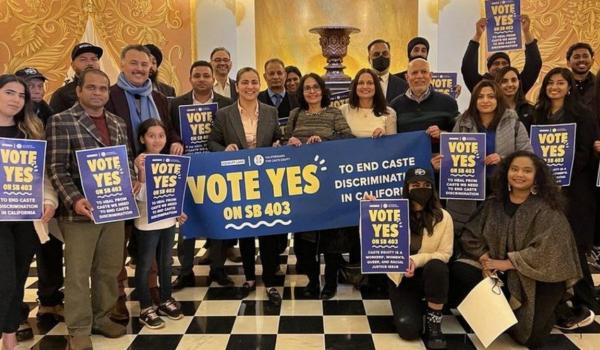Anxiety amongst upper-caste diaspora that their narrative about a benign Indian culture would be undone lies at the heart of the opposition to California’s bill to ban caste discrimination.
If all goes well, California will be the first state in the United States to ban caste discrimination. A bill to this effect, passed by the state’s assembly – hailed by civil rights activists as a victory against caste bias but caught in the cross-hairs of a powerful section of Indian Americans – has highlighted the pivotal and contentious role that caste plays in diasporic Indian culture, society and politics.
This contentious battle over a piece of legislation, which has ramifications for all Americans, is intertwined with India’s deeply polarising cultural practices and its divisive political landscape. At the one end of the spectrum is the struggle to recognise caste-based bias, and at the other is caste denial.
Discrimination in the diaspora
Caste-based discrimination in America is well documented. A survey by Equality Labs – a non-profit that advocates for Dalit rights – showed that one in four Dalits faced verbal and physical assault. One in three experienced education discrimination, and two in three workplace discrimination.
In 2020, Cisco was sued by California state regulators on allegations that two high-caste Indian managers had discriminated against a Dalit engineer by subjecting him to lower pay and inferior terms of employment. The following year, the Bochasanwasi Akshar Purushottam Swaminarayan Sanstha (BAPS) faced a lawsuit in New Jersey on charges of luring mostly Dalit labourers from India to work on temple construction in conditions that resembled forced labour.
Thenmozhi Soundararajan, the founder and executive director of Equality Labs, was to deliver a talk at Google on Dalit history in 2022 summer. It was cancelled at the last minute, reportedly due to hostility by the company’s Indian employees, who accused Soundararajan of being ‘anti-Hindu’. Google has a sizeable number of Indian-origin employees who belong to privileged castes. The CEO, Sundar Pichai, himself comes from an upper-caste Indian family.
Such documented cases may only be the tip of the iceberg.
“Dalits try and hide their identities lest they suffer its consequences at workplaces, schools and in neighbourhoods,”
India’s constitutional guarantees of equality and ban on untouchability have done little to purge from upper castes the false image of ‘impurity’ amongst Dalits. This psyche within the South Asian immigrants has been transshipped across the world and is affirmed through mundane practices, lifestyles and actions.
“Dalits try and hide their identities lest they suffer its consequences at workplaces, schools and in neighbourhoods,” a woman working in the tech sector said in an interview with us. (The woman, a non-Dalit supporter of the bill, did not want to be named).
Discrimination evinces itself in daily rituals, everyday events, and casual conversations. The tech worker pointed out that while it could be as obscene as slurs and jokes, prejudice was often veiled. Colleagues “seek details about ‘surnames’ and ‘friends’” to find out about family backgrounds and localities of descent, she said.
Or it could manifest in food practices. A South Indian restaurant in the Bay Area, for instance, adopts Sanskritised Tamil words like madisapad for its cuisine. Madisapad means ‘ritually pure food’, and the notion of purity comes from the idea of a substance insulated from even the shadow of an ‘untouchable’.
For upper-caste elites, this would pass off as culture. For the oppressed classes, it is sheer bigotry.
A supporter of the California bill said the legislation becomes important “because it delegitimises such violence of the words and conversations that are veiled casteist slurs.”
Raju Rajagopal of the Hindus for Human Rights adds a more practical dimension. Employers will have to “take the possibilities of caste discrimination seriously and to define internal mechanisms to prevent and deal with instances of caste discrimination.”



This was illuminating, I had no idea it was a real issue outside of India to be honest.
Huge issue in tech, not so much in other industries as the cultural saturation hasn’t gotten to a tipping point.